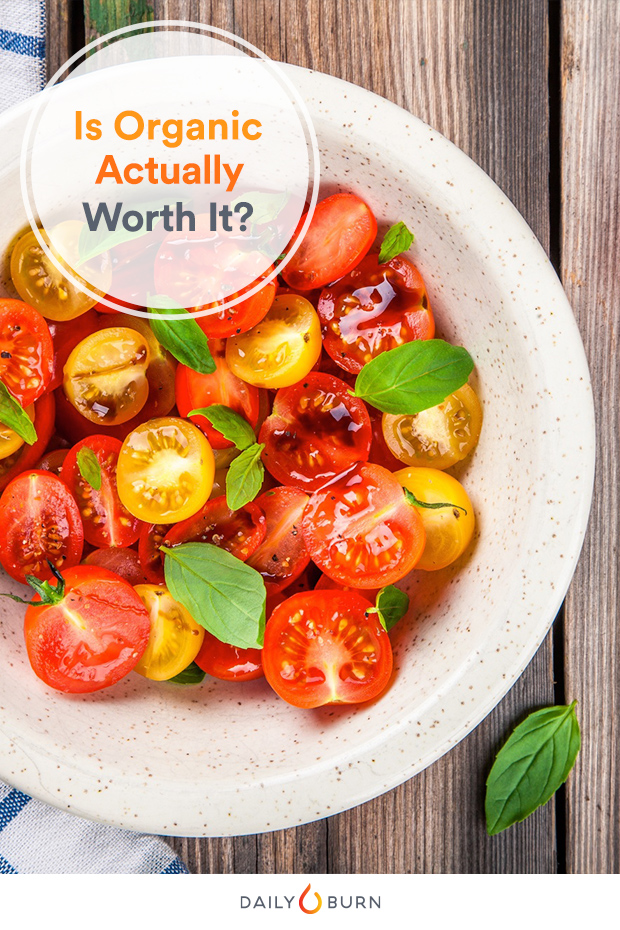
While you might like the idea of buying organic all the time, it can be hard to put your money where your mouth is — literally. You’ve also probably wondered: Are those organic strawberries really worth the splurge if you’re just tossing them into your morning smoothie? And is organically-raised beef actually better than conventional cuts? Well, a growing body of science says yes. Here’s what the latest research has to say about the nutritional benefits of going organic.
RELATED: 7 Days of Clean Eating, Made Simple
The Meat of the Matter
According to a new meta-analysis published in the British Journal of Nutrition, meat and dairy from organically-raised cows contain 50 percent more omega-3 fatty acids than those raised with conventional methods. Carlo Leifert, a professor of ecological agriculture who led the research, says it all comes down to the animals’ diets. Organically-raised cows usually graze on omega-3 rich grass instead of corn or grains, which translates into higher levels in their meat and milk.
Why does this matter? Eating a diet high in omega-3s can help protect you from the low-grade chronic inflammation that’s been linked to depression, cancer, diabetes, heart disease and a whole host of other health issues.
RELATED: 6 Everyday Habits That Are Making You Bloated
“Switching to organic or other grass-fed dairy and meat products allows you to increase omega-3 intake without a simultaneous increase in calorie or saturated fat intake,” says Leifert. The research implies that we can get more healthy fats without gorging on a quarter pounder. (But if eating significantly more omega-3s is your goal, you’re probably better sticking to something like salmon, which contains about 1,000 more milligrams per serving than grass-fed beef.)
These findings aren’t limited to cows munching on grass across the pond, either. In one 2013 study, researchers analyzed milk produced on 14 commercial farms from seven regions of the U.S. that produce both organic and conventional products. They found that the organic milk had 62 percent more omega-3s. In other words, a splash of milk with your morning oatmeal could be helping to arm your body against inflammation more if you reach for an organic carton over a conventional one.
The Dirt on Produce
Yet when it comes to organic produce, researchers haven’t always fully endorsed the “Big O.” In 2012, a Stanford University study showing that organic produce was no more nutritious than conventional alternatives made waves in the food industry. It got people so riled they started a petition to have the study retracted (which didn’t happen).
RELATED: How to Detox the Healthy Way: 16 Recipes You’ll Love
But since then, more research has revealed additional benefits of shopping organic in the produce aisle. A 2014 analysis by Leifert and his team found that organically grown fruits and veggies contain more heart-healthy antioxidants and less pesticide residue than crops grown using other methods. Their research, which analyzed 300 studies, suggests that certain mineral fertilizers used for conventional produce reduce the production of antioxidants in plants. It could also have something to do with the crop varieties organic farmers use, says Leifert.
“Organic farmers tend to choose more robust and resistant varieties, and many of the antioxidants are also components of the plants’ resistance mechanisms against pests and diseases,” he says. So, when you grab organic spinach at the market, the crop’s natural resilience will transfer a dose of antioxidants to you.
As for pesticides, scientists don’t yet have a clear understanding of the effects that exposure to the residue could have on your health, according to the National Institute of Environmental Health Sciences. Research has linked pesticides with cognitive decline and Parkinson’s disease in farm workers. Just note: These workers were around much higher levels of the chemicals than anyone who buys non-organic apples.
When to Buy Organic
Buying organic can have its health perks, but if you can’t fit all organics in your budget all the time, we hear you. Luckily, a recent analysis from the Environmental Working Group can help you prioritize when to splurge and when to save. The organization ranked 48 popular fruits and vegetables by the amount of pesticides they contain. When shopping, your best bet is avoiding the “Dirty Dozen,” aka the conventional produce that has the most pesticide residue. (Check out this helpful infographic here.)
Strawberries, apples, nectarines, peaches, celery, grapes, cherries, spinach, tomatoes, sweet bell peppers, cherry tomatoes and cucumbers top the “Dirty Dozen” list, meaning you should go organic when any of these are on your grocery list. On the other hand, avocados, sweet corn, pineapple, cabbage and onions are some of the cleanest types of conventional produce. (They have the least amount of pesticide residue.) Translation: You’ll survive if you opt for cheaper avocados for your next Taco Tuesday.
